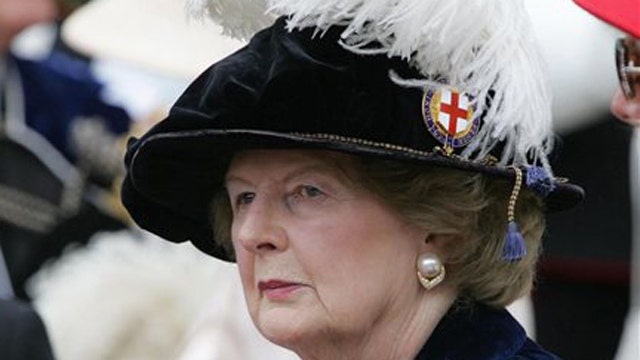Power Play 4/8/2013
What's a win for Obama on guns? The legacy of Margaret Thatcher. Plus – the latest on the Korean conundrum.
“The trouble with you, John, is that your spine does not reach your brain.”
-- Margaret Thatcher, as former prime minister speaking to a member of her party who supported Britain’s entry into the European Union in 1992, as reported by The Times of London.
One supposes that if Margaret Thatcher has arrived in Heaven, she is already about the work of reorganizing and improving things. Tune up those harps. Enunciate your hosannas, boys. Some spit and polish for the pearly gates, Peter, if you please.
Perfection would be no paradise for Thatcher, whose life was devoted to the struggle for reform. She was a woman whose iron will and boundless energy were consumed by the need for change.
American conservatives have venerated Ronald Reagan, and with good cause. Not only did he bring their movement into the mainstream by proving its principles electorally and practically effective, but he did so with warmth and charm and grace. He defied the caricatures of conservatives as either John Birch radicals or snobbish misers indifferent to human suffering.
Republicans have been asking for years “what would Reagan do?” It’s a silly question because it is not possible for another politician, especially one lacking his prodigious gifts and character, to do what Reagan would have done. Projecting forward what Reagan would have said or done about the matters of today or how he would present conservatism 24 years after he left office is a fool’s errand.
Republicans can learn from him and his success in turning a 50-year political tide in America, but his policies without his person are pointless in practice.
And there are no Reagans on the horizon for the GOP. He was already famous before he became the two-term governor of the largest state in the Union. He was already steeped in the ideals and aspirations of his movement before he rose to the national stage. He was the “great communicator” before he ever ran for president.
But there might be a Maggie Thatcher or two out there for the GOP.
Republicans have some rising stars, to be sure. But the shortage of top talent left over from a bruising two-term presidency and two successive electoral wipeouts for the party is acute. These punishing years for Republicans have advantages in that it has allowed new blood to flow in and opened minds to new thinking.
Politicians are often lying, especially when they say that setbacks have been “liberating.” But parties can find liberation in defeat. And while the old order in Republicanism is becoming more assertive amid worries that the upheaval of 2010 and beyond is too damaging, “the establishment” is now just another warring faction inside the party.
[pullquote]
Money, authority and opinion have been decentralized in some profound ways since 2008 and at least until there is another Republican president, there seems little chance that any new order will arise.
A party with superstars, without an heir apparent and without an ideological captain is a tumultuous place. But it’s also a place of unique opportunities.
When Thatcher took control of her party in 1975, the Conservatives had rather badly lost their way. The party was in defeat and the moderate, blue-blooded old guard was in a shambles. A woman and one of middle-class origin, Thatcher had been something of a novelty when she was tapped to be education secretary in the prior Tory government, but certainly was not someone who would five years later seize control of the party.
But the damage done to the party two prior Conservative premierships and the rapid advancement of Continental-style socialism in Britain had left her party willing to try almost anything in a bid to be relevant.
She was not a movie star, nor had she held a prior position of huge importance. She had been grinding out the work of government and legislation for 16 years. But she fought and pressed and pushed her way to the front of the line, always emphasizing ideas and the need for new ones. She turned her political disadvantage – being a woman of common birth – and turned it into her advantage.
Today’s American Republicans could certainly use someone of her force of will and personality. There are lots on the American right with big ideas, but seem to lack Thatcher’s consuming fire. Those with consuming ambition often seem to be the ones without the big ideas.
(W.B. Yeats is irresistible to Power Play on this point: “The best lack all conviction while the worst are full of passionate intensity.)
But out of the chaos on the right, a Thatcher or two may be rising even now: thoughtful, urgent and eloquent with a biography that defies conventional thinking about the party. If America is ready for change in 2016, one of them may have the chance to do what she did and reset the trajectory of their nation.
Chris Stirewalt is digital politics editor for Fox News, and his POWER PLAY column appears Monday-Friday on FoxNews.com. Catch Chris Live online daily at 11:30amET at http:live.foxnews.com.












































